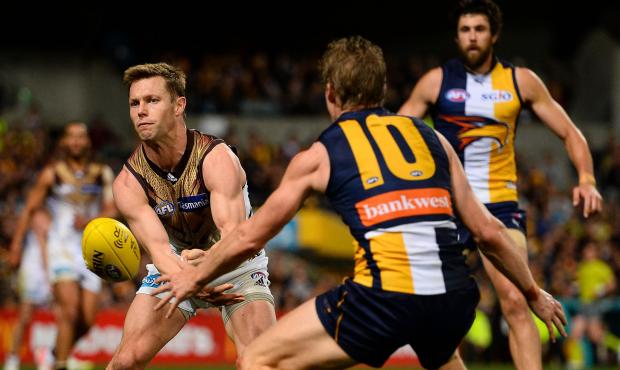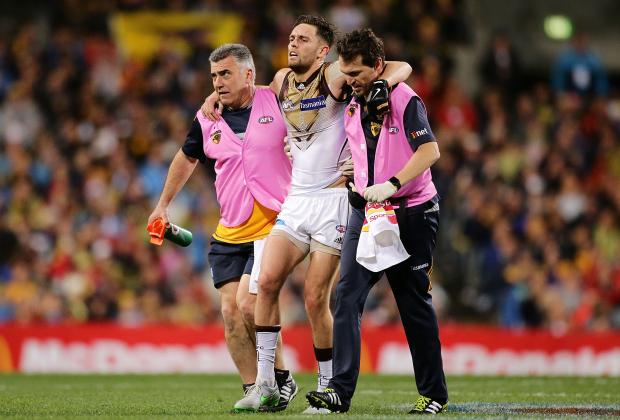WEST Coast beat Hawthorn at its own game in the second qualifying final at Domain Stadium.
When the Hawks beat the Eagles by 14 points at the same venue in round 19, they had dominated the clearances 57-44 and the centre clearances 15-6.
West Coast had been without star ruckman Nic Naitanui that night, and Hawks pair Ben McEvoy and Jonathon Ceglar had led their team to a 62-52 hit-outs advantage as Scott Lycett handled the Eagles' ruck duties almost singlehandedly.
With the return of Naitanui for the qualifying final – and Callum Sinclair coming in for Lycett – the Eagles won the hitouts 59-46 (with 40 to Naitanui), but the Hawks again won the clearances (50-40) and centre clearances (15-7) decisively.
For once, however, the competition's best ball-users let themselves down with their disposal, with West Coast's fanatical all-ground pressure rattling the normally composed Hawks into a spate of uncharacteristic turnovers.
In the game-shaping second quarter when the Eagles slammed on five goals to none to take a 32-point lead into half-time, Hawthorn's kicking efficiency slumped to a lowly 49 per cent.
The Eagles kept up the pressure in the third term, kicking five goals to two to go into three-quarter time with an unassailable 50-point lead.
Having kicked just four goals to three-quarter time, the Hawks salvaged some pride in the final term as the sting went out of the game, kicking five goals to cut their final losing margin to 32 points.
But West Coast's win was so emphatic it installed Adam Simpson's men as the premiership favourites and cast severe doubts over Hawthorn's quest for a third successive flag.
Click here for full match coverage and stats from the qualifying final
Key moments
1. When Jarryd Roughead missed a snap from 50m at the six-minute mark of the second term, the Hawks were just five points down.
But West Coast took control of the game from there, with spearhead Josh Kennedy kicking the game's next three goals to stretch his side's lead to a very handy 25 points.
The first came from a clinical mark on the lead, the second from a mark running back with the flight of the ball after Naitanui had won a critical ground ball on the wing, and the third from a booming set shot from outside 50m that had followed a Cyril Rioli turnover across the Hawks' half-forward line.
If you don't mind Nic Nat! #AFLFinals http://t.co/ha7TgsZ9NT
— #AFLFinals (@AFL) September 11, 2015
2. Hawthorn predictably came out firing after the half-time break and looked back in the game when they kicked two of the first three goals in the third term to cut the Eagles' lead to 24 points.
So when Mark LeCras marked just inside the boundary line 35m out from the Eagles' goal at the 18-minute mark of the term, the pressure was on.
The sharpshooter was up to the task. Running around to improve his angle, he expertly curled the ball through the big sticks.
LeCras' goal was the first in an unanswered four-goal run that sent the Eagles into three-quarter time with a 50-point lead, and safe in the knowledge that they had all but secured a home preliminary final.
Nothing is impossible from this pocket! #AFLFinals http://t.co/CUsxF1LZeO
— #AFLFinals (@AFL) September 11, 2015
Key players
Luke Shuey was outstanding for West Coast with 25 disposals, 11 contested possessions and an equal team-high six clearances. Significantly, the midfielder was at his best in the Eagles' five-goal-to-nil second quarter, winning 11 possessions (eight contested).
Kennedy (three goals) was also instrumental in setting up the Eagles' win, combining well with fellow forward LeCras (two goals) as the home side took 17 marks inside its forward 50 (five each to Kennedy and LeCras) to the Hawks' 10.
Naitanui (12 contested possessions) dominated Hawks ruckmen McEvoy and David Hale, particularly after half-time, while Eagles captain Shannon Hurn was an important playmaker with 26 disposals off half-back.
Sam Mitchell stood out for the Hawks with a game-high 35 disposals and 10 clearances, while skipper Luke Hodge worked his way into the game after a quiet first half to finish with 29 disposals and one goal.
Mitchell looms as a key factor in the 2015 season decider on Saturday. Picture: AFL Media
The teams' form at the time
West Coast and Hawthorn both entered the qualifying final with some question marks on their form.
The Eagles had been smashed by Adelaide at the Adelaide Oval in round 22 by 57 points, before a 95-point victory over St Kilda in the final round that was probably a softer preparation than Adam Simpson would have liked ahead of the finals.
After getting their season back on track with eight straight wins from rounds 9-17, Hawthorn lost to Richmond in round 18 and, in a big upset, Port Adelaide at Etihad Stadium in round 21.
Big wins over the bottom two teams, Brisbane Lions and Carlton, in the final two home and away rounds did not provide much of a guide to the Hawks' finals prospects.
However, they would have taken confidence from their hard-fought 14-point win over West Coast at Domain Stadium in round 19.
Who was missing?
The Hawks' dominance of the clearances in the qualifying final was at least partially explained by the absence of West Coast's premier inside ball-winner, Matt Priddis, with a quad injury.
Chris Masten was also sidelined with a hamstring injury, while key defender Jeremy McGovern courageously carried an injured shoulder through the final three quarters.
All three Eagles got through Saturday night's preliminary final win over North Melbourne unscathed and are expected to be available for the Grand Final.
The Hawks were at full strength in the qualifying final, but wingman Isaac Smith was a shadow of his usual self after carrying a knee injury into the game, while forward Jack Gunston suffered an ankle injury in the fourth quarter.
Smith has since returned to form and fitness in the Hawks' finals wins over Adelaide and Fremantle, but Gunston missed both games and faces a race against time to prove his fitness for the Grand Final.
Will Gunston earn a recall for the Grand Final at a teammate's expense? Picture: AFL Media
What both sides learned from the game
The Eagles know that even if Naitanui dominates Hawthorn's ruckmen in the Grand Final, that won't necessarily give them an advantage around the stoppages. Led by clearance king Mitchell, the Hawks sharked Naitanui's hit-outs time and time again in the qualifying final to dominate the clearances. Presumably, the Eagles will have spent considerable time on the training track trying to make their hit-out patterns less predictable.
The Hawks learned that to win the Grand Final they have to handle the Eagles' pressure a whole lot better. All too often in the qualifying final, Hawthorn missed targets by hand and foot that they would normally hit in their sleep, as the Eagles' pressure – and, at times, inferred pressure – took a toll. The Hawks simply have to show more composure in the Grand Final or they will get burnt on the counter-attack again.
What it means for the Grand Final
Probably not that much – at least not mentally. The Hawks are too experienced and mentally tough to carry any psychological scar tissue into the Grand Final. However, the Eagles' qualifying final win – and subsequent week off – could give them a physical advantage. The Hawks' three premiership wins under Alastair Clarkson have all come after they've enjoyed a week off in the second week of the finals. Playing all three weeks in the lead up to the premiership decider could take the edge off Hawthorn. Especially after two trips to Perth. Especially when key players Mitchell, Hodge, Josh Gibson, Shaun Burgoyne, Brian Lake and David Hale are all over 30.



